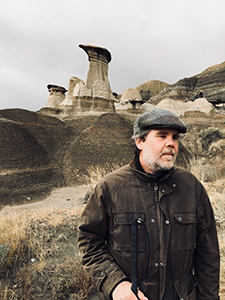Colloquial Elements: William Thompson in Conversation with David Gerow

David Gerow, whose story "New Directions in Focus Group Studies" appears in the Malahat's Autumn 2018 issue, discusses humour, discord, and how academic and theatre writing influenced his story in his Q&A with Malahat volunteer William Thompson.
David Gerow grew up in Brantford, Ontario and attended the University of Guelph. He spent nine years working various jobs (often teaching English) in China, South Korea, Italy and Newfoundland. He currently lives in Scotland with his wife and daughter and is a part-time PhD student at the University of Glasgow. He has previously had stories published in The Danforth Review and Hobart, and his first professionally produced play premiered in October, 2018 at Oran Mor, Glasgow.
Hybrid stories can be an interesting way to tell a story. Could you comment on your approach to “New Directions in Focus Group Studies?” Why tell the story as a report?
I’ve done a lot of freelance academic proofreading, and it got me thinking about the academic study as a genre. It’s unlike other literary genres because the aim of academic writing is precision/clarity; lyricism is pretty much out of the question. But because a lot of researchers (particularly in the soft sciences) explore people’s experiences/interactions/behaviours, there’s all sorts of emotionally charged content underneath the scholarly veneer, and the stiff, prescribed style of academic writing sometimes provides an amusing/ironic counterpoint to that intriguing emotional stuff. “New Directions in Focus Group Studies” is an attempt to mine the comic and dramatic potential of that contrast between rigid reporting and deeply felt emotion.
I particularly like working on papers that include quotes from interviews or focus groups. You’ll have pages and pages of scholarly precision, then suddenly there’ll be a complete shift in voice/tone because the researcher has gone out and interviewed people who use slang, contractions, swear words: a whole range of colloquial elements that the researcher doesn’t use. Those quotes provide stylistic relief, but they also remind you that the paper isn’t just theoretical, but is about real people whose voices you can access. I included lengthy interview excerpts in “New Directions.” They give voices to Claire’s daughters, they give the reader a more direct window onto the central relationships, they provide a bit of relief from the highfalutin language (although not a total relief because even the transcripts are affected by academic conventions), and I think they serve to emphasize the comedic/sociopathic tone of the rest of the story.
Claire Benson is the author of the report, the leader of the focus groups, and, as we learn, the mother of two teenage daughters who participate in the focus groups. As a writer, how much did you need to understand about Dr. Benson's relationship with her children before writing the story?
I had a pretty clear picture of life in the Benson household when I was writing the story. Claire in particular has a lot going on in her life as she carries out this study; she’s making big decisions that are going to impact everybody and which will, I fear, come back to bite her after the narrative finishes. This is more than a research project for her; it’s a turning point in her life, and probably not a positive one in the long term. I really feel sorry for Claire.
And of course I pity her daughters, these two intelligent, articulate teenagers with all sorts of potential, but whose mother seems only to focus on what she perceives to be their shortcomings (most of which are just the fact that they’re teenagers). The events of the story are the culmination of years of poorly tended relationships. Some of this history appears on the page and a lot doesn’t. I guess that’s the iceberg theory in practice, something the pseudo-academic style is really conducive to because there’s a lot of information you just wouldn’t include in an academic report, so a lot of things are necessarily left unsaid.
What was it like writing this story as compared to other pieces you’ve written? Do you tend to use humour or themes of family discord in your work?
I tend to have humour but I’m flexible on the family discord. Any kind of discord will do. I am fond of characters like Claire who fail to acknowledge the emotional weight of a situation. I find that kind of thing really funny. Maybe there’s something wrong with me.
How does your academic background figure into your writing process? What is it like moving between academic writing and writing fiction?
I haven’t done all that much academic writing, really. I’ve mostly read other people’s. But when I have done it myself, I tend to find it stifling because of all the conventions you’re bound by, but also enjoyable in the way that a puzzle is enjoyable: you’ve got to be as exact/unambiguous as possible; you’ve got to find the correct words to precisely express your ideas. Fiction is often about leaving things unsaid and inviting the reader to draw on their own experiences/perceptions to fill in blanks, but in an academic article, you’ve got to lay everything out so you can convince your reader of whatever it is you’re arguing, or so you can report on an event with impartial accuracy. I generally find it more fun to leave blanks.
You also have a background in theatre. Does writing for the stage affect the way you want to tell stories?
I like writing in characters’ voices rather than using omniscient narrators in stories. I prefer a first person narrator with a bias and a stake in things. “New Directions” is more or less a stylized monologue interspersed with some eight-character scenes (the focus group transcripts are essentially scripts), so I’d say a strong theatrical influence is apparent in this story.
Finally, what books or authors represent a point of connection or influence for you and your writing?
In terms of this particular story, the starting point was the academic papers I was working on. They provided the structure/tone/parameters. But I was worried about accessibility. So many stories today are pithy and staccato in that post-Hemingway style, and this story just couldn’t follow that trend, which I worried would make it off-putting to readers. I fretted about that for a while, but I finally gave myself licence to write as densely/precisely as was required after reading some thick David Foster Wallace stories (“Mister Squishy” is a good example). Wallace writes colloquial English very realistically in some stories (as in “Brief Interviews”), but he’s not afraid of a sentence with multiple subordinate clauses, and he’s extremely entertaining.
Also influential on this story were George Eliot, Thomas Hardy, Dickens, the narrator in Barry Lyndon (the movie; I’ve not read the book): It’s that dry, wry, witty, sterile, restrained voice of the Victorians/Edwardians, which is probably the literary era most comparable to academic writing (lots of commas and perfect grammar).
Finally, George Saunders has a couple of stories far better than this one written as reports/proposals of various kinds, each of them quite a bit darker than this. Luckily for me, he’s never done a story in this particular style. If he had, I wouldn’t have bothered, as he’s really the master of this kind of thing as far as I’m aware.

William Thompson
* * * * * * * *









